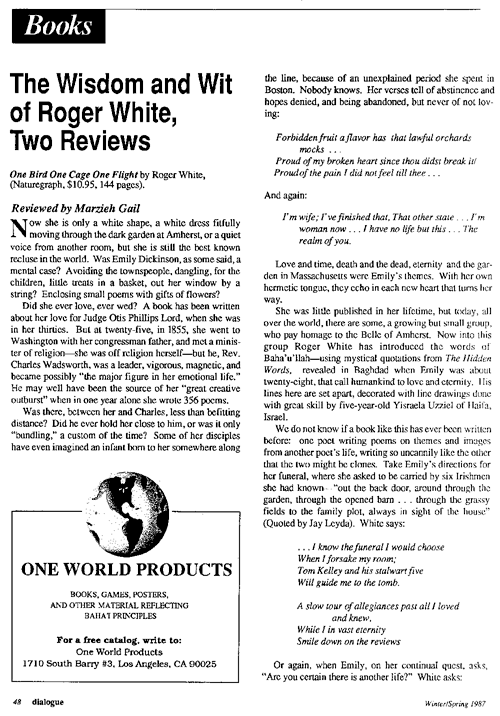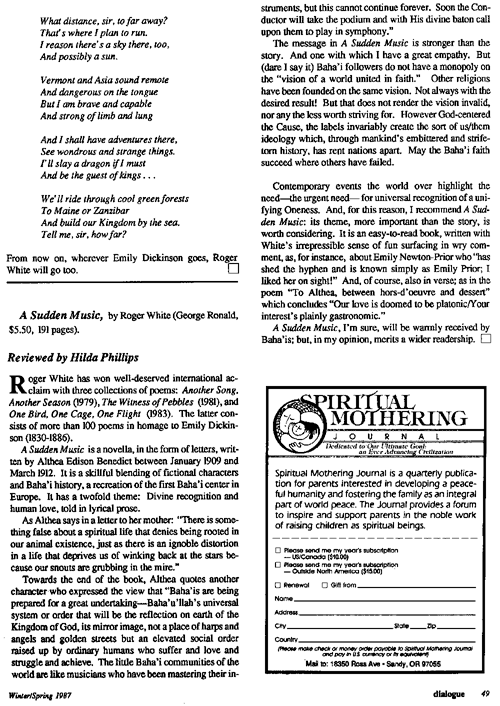
|
|
Abstract: Reviews of White's books One Bird One Cage One Flight and A Sudden Music. Notes: See also list of dialogue articles or image scans. |
The Wisdom and Wit of Roger White:
Two Reviews
by Marzieh Gail and Hilda Phillips
published in dialogue, 1:4, pages 48-49Los Angeles: 1987
By Roger White
Naturegraph, $10.95, 144 pages
Reviewed by Marzieh Gail
Dialogue 1987, Vol. 1, No 4, pp. 48-9
Now she is only a white shape, a white dress fitfully moving through the dark garden at Amherst, or a quiet voice from another room, but she is still the best known recluse in the world. Was Emily Dickinson, as some said, a mental case? Avoiding the townspeople, dangling, for the children, little treats in a basket, out her window by a string? Enclosing small poems with gifts of flowers?
Did she ever love, ever wed? A book has been written about her love for Judge Otis Phillips Lord, when she was in her thirties. But at twenty-five, in 1855, she went to Washington with her congressman father, and met a minister of religion—she was off religion herself—but he, Rev. Charles Wadsworth, was a leader, vigorous, magnetic, and became possibly “the major figure in her emotional life.” He may well have been the source of her “great creative outburst” when in one year alone she wrote 356 poems.
Was there, between her and Charles, less than befitting distance? Did he ever hold her close to him, or was it only “bundling,” a custom of the time? Some of her disciples have even imagined an infant born to her somewhere along the line, because of an unexplained period she spent in Boston. Nobody knows. Her verses tell of abstinence and hopes denied, and being abandoned, but never of not loving:
Forbidden fruit a flavor has that lawful orchards mocks….And again:
Proud of my broken heart since thou dist break it!
Proud of the pain I did not feel till thee....
I’m wife; I’ve finished that, That other state…I’m woman now…I have no life but this…The realm of you.Love and time, death and the dead, eternity and the garden in Massachusetts were Emily’s themes. With her own hermetic tongue, they echo in each new heart that turns her way.
She was little published in her lifetime, but today, all over the world, there are some, a growing but small group, who pay homage to the Belle of Amherst. Now into this group Roger White has introduced the words of Bahá'u'lláh—using mystical quotations from The Hidden Words, revealed in Bagdad when Emily was about twenty-eight, that call humankind to love and eternity. His lines here are set apart, decorated with line drawings done with great skill by five-year-old Yisraela Uzziel of Haifa, Israel.
We do not know if a book like this has ever been written before: one poet writing poems on themes and images from another poet’s life, writing so uncannily like the other that the two might be clones. Take Emily’s directions for her funeral, where she asked to be carried by six Irishmen she had known “out the back door, around through the garden, through the opened barn…through the grassy fields to the family plot, always in sight of the house” (Quoted by Jay Leyda). White says:
…I know the funeral I would chooseOr again, when Emily, on her continual quest, asks, “Are you certain there is another life?” White asks:
When I forsake my room:
Tom Kelly and his stalwart five
Will guide me to the tomb.
A slow tour of allegiances past all I loved and knew,
While I in vast eternity
Smile down on the review
What distance, sir, to far away?From now on, wherever Emily Dickinson goes, Roger White will go too.
That’s where I plan to run.
I reason there’s a sky there, too,
And possibly a sun.
Vermont and Asia sound remote
And dangerous on the tongue
But I am brave and capable
And strong of limb and lung.
And I shall have adventures there,
See wondrous and strange things.
I’ll slay a dragon if I must
And be the guest of kings….
We’ll ride through cool green forests
To Maine or Zanzibar
And build our Kingdom by the sea.
Tell me, sir, how far?
By Roger White
George Ronald, $5.50, 191 pages
Reviewed by Hilda Phillips
Dialogue 1987, Vol. 1, No 4, p. 49
Roger White has won well-deserved international acclaim with three collections of poems: Another Song, Another Season (1979), The Witness of Pebbles (1981), and One Bird, One Cage, One Flight (1983). The latter consists of more than 100 poems in homage to Emily Dickinson (1830-1886).
A Sudden Music is a novella, in the form of letters, written by Althea Edison Benedict between January 1909 and March 1912. It is a skillful blending of fictional characters and Bahá'í history, a recreation of the first Bahá'í center in Europe. It has a twofold theme: Divine recognition and human love, told in lyrical prose.
As Althea says in a letter to her mother: “There is something false about a spiritual life that denies being rooted in one animal existence, just as there is a ignoble distortion in a life that deprives us of winking back at the stars because our snouts are grubbing in the mire.”
Towards the end of the book, Althea quotes another character who expressed the view that “Bahá'ís are being prepared for a great undertaking — Bahá'u'lláh’s universal system or order that will be the reflection on earth of the Kingdom of God, its mirror image, not a place of harps and angels and golden streets but an elevated social order raised up by ordinary humans who suffer and love and struggle and achieve. The little Bahá'í communities of the world are like musicians who have been mastering their instruments, but this cannot continue forever. Soon the Conductor will take the podium and with His divine baton call upon them to play in symphony.”
The message in A Sudden Music is stronger than the story. And one with which I have a great empathy. But (dare I say it) Bahá'í followers do not have a monopoly on the “vision of a world united in faith.” Other religions have been founded on the same vision. Not always with the desired result! But that does not render the vision invalid, nor any the less worth striving for. However God-centered the Cause, the labels invariably create the sort of us/them ideology which, through mankind’s embittered and strife-torn history, has rent nations apart. May the Bahá'í Faith succeed where others have failed.
Contemporary events the world over highlight the need — the urgent need — for universal recognition of a unifying Oneness. And, for this reason, I recommend A Sudden Music: its theme, more important than the story, is worth considering. It is an easy-to-read book, written with White’s irrepressible sense of fun surfacing in wry comment, as, for instance, about Emily Newton-Prior who “has shed the hyphen and is known simply as Emily Prior; I liked her on sight!” And, of course, also in verse; as in the poem “To Althea, between hors-d’oeuvre and dessert” which concludes “Our love is doomed to be platonic/Your interest’s plainly gastronomic.”
A Sudden Music, I’m sure, will be warmly received by Bahá'ís; but, in my opinion, merits a wider readership.
 click for larger image |
 click for larger image |
|
|